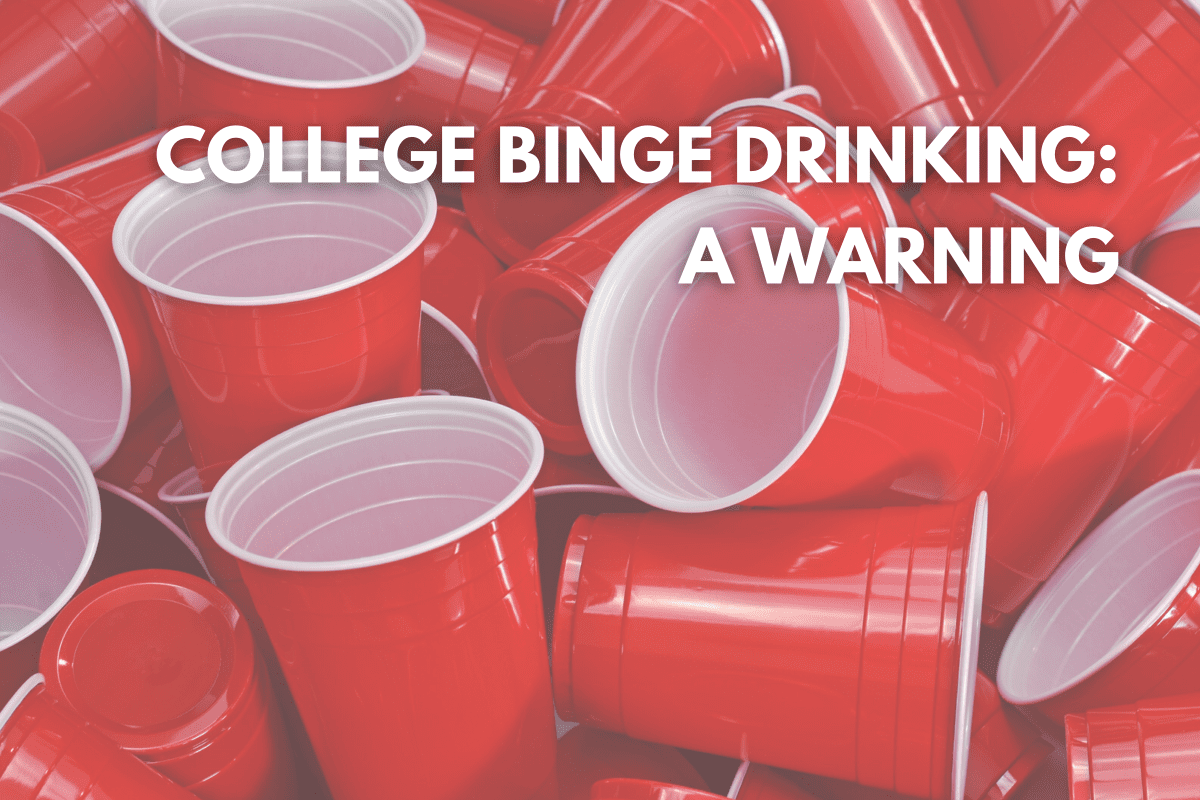Compared to all other age groups, binge drinking is most common amongst young people. According to the 2019 National Survey on Drug Use and Health, more than half of full-time college students said they drank alcohol in the past month—including those that were underage— and one-third (33%) admitted to engaging in binge drinking. However, even the occasional heavy drinking session can have disastrous health and social repercussions.
What Is Binge Drinking?
Binge drinking is defined as consuming 5+ drinks for males, or 4+ drinks for females in two hours. Comparatively, a moderate or “normal” drinking amount is considered to be two or fewer drinks a day for men, and one or less for women over the course of an entire day. Engaging in binge drinking five or more days in a month then falls under the category of heavy alcohol use. Both of these patterns of excessive drinking are dangerous and can heighten the risk of alcohol addiction.
Binge Drinking Statistics
- 17 billion total binge drinks are consumed per year in the U.S.
- 1 out of every 4 American adults have engaged in binge drinking in the past month
- Binge drinking is most common amongst 18-34-year-olds, and twice as likely to be done by a male than a female
- Lower education levels are correlated with increased instances of binge drinking behavior
Consequences of College Binge Drinking
The after-effects of any level of irresponsible alcohol consumption are never pretty. However, the consequences can be particularly devastating to young adults, many of whom are away from home and living independently for the first time in their lives.
Poor Academic Performance
The hippocampus is the part of the brain that plays a major role in learning and memory. It is extremely vulnerable and particularly so to the effects of alcohol consumption and studies have shown that alcohol can negatively affect long-term memory. However, adolescent brains (those under the age of 25 who are not yet fully developed) face even greater sensitivities. The immediate impact is obvious: With so much of school requiring critical thinking and rote memorization, alcohol use can directly affect one’s grades and overall academic performance. However, this is the mildest of all the things that can go wrong.
Disciplinary Action
Many schools prohibit bringing or consuming alcohol on school grounds, especially for those who are underage. Breaking this rule can bear severe consequences. It could involve an official mark on your permanent record which could tarnish your reputation and hurt your odds for graduate school or a professional license. It could affect the financial aid you would receive. The worst-case scenario: It could end up in expulsion and end up on your criminal record.
Alcohol Addiction
Of course, there’s always the risk of developing a use disorder with any substance abuse. According to SAMHSA, approximately 10% of young adults aged 18 to 25 years old had alcohol use disorder, about 3.4 million. Although these rates have decreased from previous years, this age cohort still has nearly double the rate of AUDs of the others.
Overdose
Another risk of college binge drinking that’s closely related to addiction is alcohol overdose. Also known as alcohol poisoning, this is when the blood alcohol levels or BAC levels reach dangerous proportions. Too much alcohol in the bloodstream can cause the brain to shut down, resulting in a potentially fatal slowing of respiratory and cardiovascular function. In a study of heavy episodic drinking of 18-24-year-olds, there has been a 26% increase in the number of alcohol overdose hospitalizations. It can be tricky to detect as the beginning stages may resemble a person who is severely intoxicated and if not treated immediately, can quickly become fatal.
Sexual Assault
In 2019, there were an estimated 97,000 cases of sexual assault and rape-related to alcohol consumption. Alcohol impairs decision-making and judgment which can lead individuals to be more prone to violent behavior, and their victims to be less equipped to handle the situation.
Death
The most sobering consequence of all, it’s estimated that there were about 1,519 alcohol-related deaths amongst college students (although other studies suggest that number may be much higher). This also includes deaths related to unintentional injuries (like a slip and fall), motor vehicle accidents, and overdose.
College is where young adults go to broaden their minds, make lasting friends and memories, and ultimately, learn foundational knowledge for their future careers. Quite contradictorily, college is also a place where binge drinking and other reckless behavior run rampant. With so much of their lives ahead of them, college students must protect themselves, part of which might involve going to rehab for a drinking problem. If you have a young adult who exhibits signs of alcohol addiction at home, an addiction treatment facility can help manage those compulsions before ruining their academic career.
Source:
https://www.niaaa.nih.gov/alcohol-health/overview-alcohol-consumption/moderate-binge-drinking
https://www.niaaa.nih.gov/publications/brochures-and-fact-sheets/alcohol-facts-and-statistics

































